Water, The Essence Of Life: How Much Water do We Actually Need To Drink And Why Is It So Important?! 💧
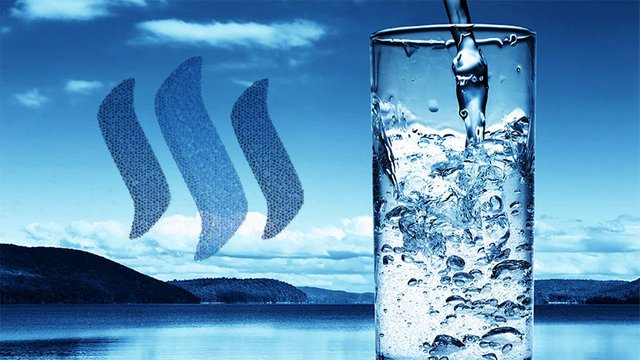
Water is the source of life.
It's essential to ALL life on earth - humans, plants and animals all depend on it!
Enough clean, drinking water is a key factor to mental and physical well being.
Many people actually underestimate the importance of water for our health, and have no idea how much proper hydration could improve their life!
We humans actually consist to 60-65% of WATER! (And Babies even 75%, which drops within their first year of life).
Our important vital Organs are also mostly made up of water - our lungs consist of 83% water, while our heart and brain consists of 75% water!
But why exactly is water important for our health, how much do we need, and what would happen if you stopped drinking water?
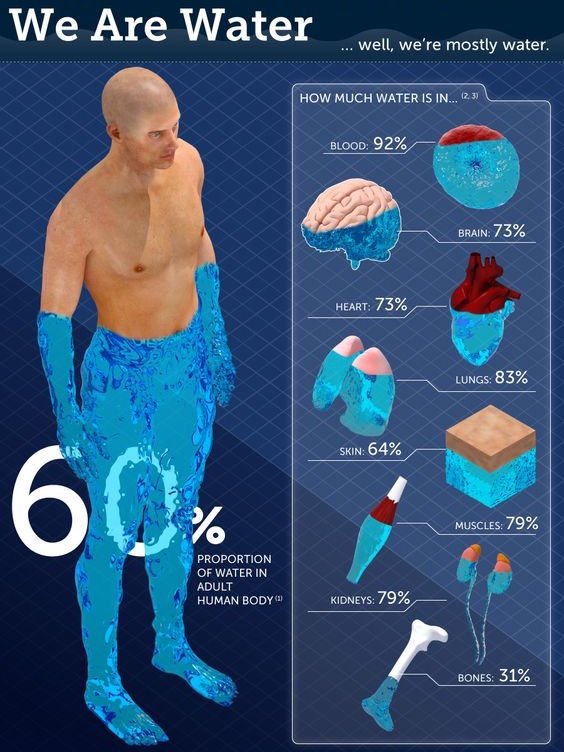
What does water do in our bodies?
Water is a very important component of many tasks that our body executes regularly.
Firstly, it carries nutrients across the body, and is of course contained in our blood as well.
Water also lubricates our mucous membranes like the eyes, mouth and nasal area,
It also helps regulate our body temperature, helps to bolster joints, moisturizes our skin and keeps it flexible, and is extremely portant to our brain's health and functionality.
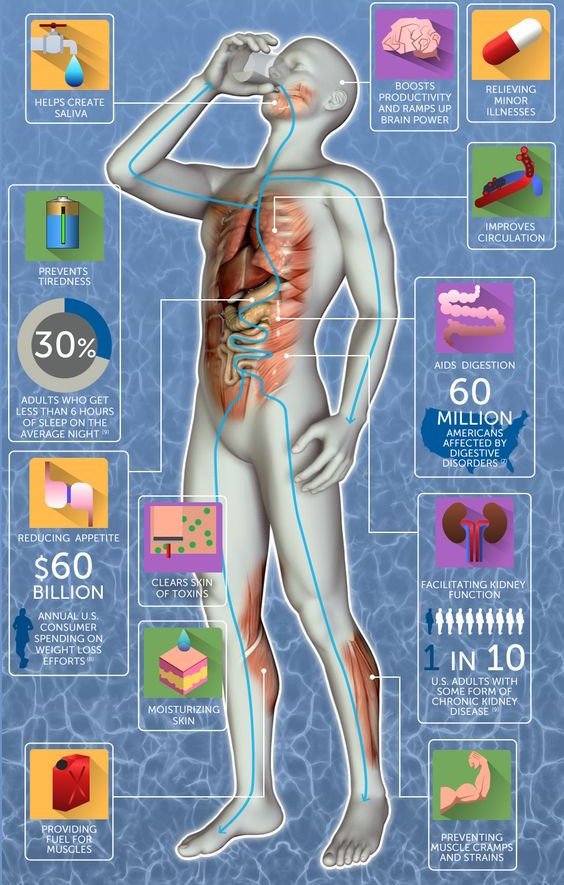
How much do we actually need to drink?
Drinking enough water is probably one of the most hyped health-related topics ever.
I've also written a post about it previously, explaining the health benefits of staying hydrated.
Adults lose about 2-3 liters of water daily - due to bowel movements, sweating, and even breathing.
So it's obvious that we need to drink a lot in order to compensate for that loss - but there's quite a lot of answers to the question how much we actually need to drink.
You might have heard of the "8 glasses of water a day" rule, but that's been debunked.
The truth is that the amount of water each person needs depends on a lot of different, personal factors - for example weight, gender, environment, and level of physical activity.
The recommended daily amount varies between 2 and 3.7 liters.
Of course, liquids are also taken in through certain foods - fruits and vegetables are mostly made up of water, so they can add to your daily water intake as well.
A general rule is to divide your body weight by 2, and then divide it again by 8. The result will be how many cups you should drink per day (But this doesn't calculate gender, activity and environment factors, so the result still isn't totally accurate!)
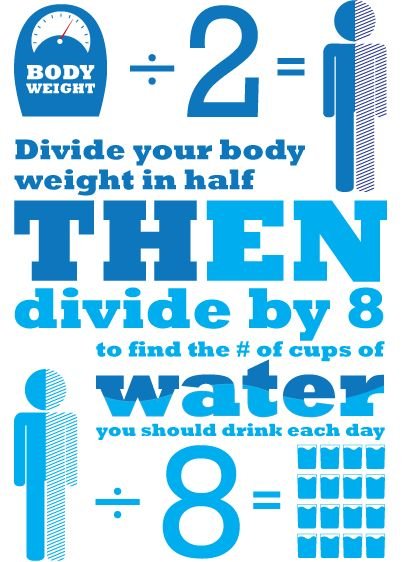
What happens when we don't drink enough?
Our thirst is controlled by our hypothalamus.
Your body has certain sensors in the blood vessels that check the concentration of sodium and other components of your blood constantly.
If you are not hydrated enough, your blood pressure and overall blood volume is being lowered, and the brain sends out the signal to drink.
At the same time, the antidiuretic hormone gets released by hypothalamus.
As soon as that reaches your kidneys, it activates a certain mechanism which makes the blood absorb and preserve more water (the channels that make this posible are called Aquaporins).
This is the reason why dehydration makes your urine darker - because it's more concentrated!
When you don't drink enough water, symptoms include having a dry mouth (obviously), less energy, decreased mood, less skin moisture which leads to skin irritations, and after a while you will notice signs of your brain slowing down.
Water is especially important for your brain - as mentioned above, your brain actually is 75% water!
So when you're dehydrated, it's no surprise that your brain actually shrinks in size, and it's much harder for your bain to keep up with its tasks and perform at its usual speed.
Studies with groups pf subjects that were either fully hydrated or dehydrated have shown that executing the same tasks 'costs' the dehydrated brains a lot more brain power and oxygen.
You may also get a headache, feel light-headed, and the response time (and overall speed with which your brain processes information) drops.
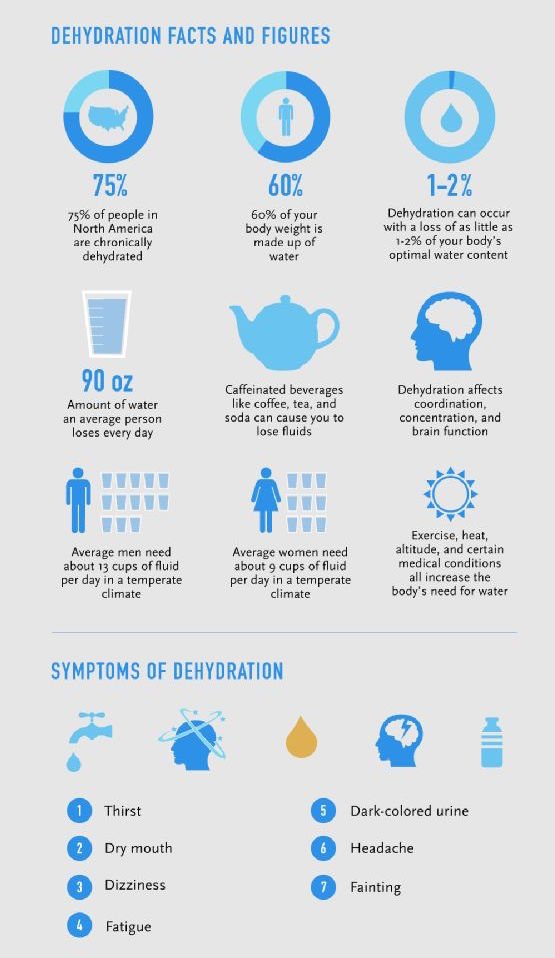
And what if you stopped drinking at all ?
Water is actually more important to your body than food.
While you can survive without food for over a month (depending on the conditions) it would only take a few days until you died from the results of dehydradtion.
After the first 1-2 days without drinking water, you couldn't pee at all anymore - there would simply be no fluid left for your brain to produce urin.
The same goes for your saliva, it would become harder and harder to swallow anything, your mouth would dry up.
But the worst effects would still happen to your brain: people who don't drink for several days get so dehydrated that they suffer the most from an extremely decreased brain function and get very delirious.
After 3-5 days without water, your body ultimately starts to shut down its organs - and the brain as well, so you would die.
I know that sometimes, it can be hard to drink enough water throughout a busy day.
But as you can see, water is an extremely important component to our body's health, and especially to our brain!
Try drinking 2-3 liters of water a day for a few weeks, and let the results speak for themselves!
Images: Logo, 1, 2, 3, 4, 5, Sources: 1, 2, 3, 4

© Sirwinchester
Great post and i completely agree I drink a gallon of water a day and have for years now. I almost never crave any other drink besides water( besides beer and wine) Maybe i can get @fyrstikken to stop drinking coke.
I think nowadays people always say that we should drink 8 bottles of water a day, which is about 2L of water per day. But actually 2L is the daily intake. Not only coming from drinking water, drinking some beverage and eating fruit and even drinking soup wI'll also be counted. So don't be too scary about not drink enough water :)
It's better to drink too much than too little; my advise is to simply drink till you piss clear every time you pee, preferably once every 2-3hours or less.
Yes . I agree that drinking more water is definitely good for health. I just state that don't too nervous about how much water need to be drunk in one day to get health. And actually most people's habit can get enough water in daily life. But it is the best when you are drinking water:)
Great post sirwinchester! I like water so I must also like 60-65% of you too!
😬 yes I guess so!
Oooo like like? Aye girl, lets get moist with some Netflix and condensation ;)
In some country's in the world, they put fluoride in the drinking water. This is extremely toxic in high doses. I would definitely research the water you're drinking and the topic of fluoride as well. On toothpaste packages in the Netherlands it says when u swallow the size of a pea of toothpaste (with fluoride ) you should contact a doctor! Great post though,
Cheers,
ernstjan
Yes I know, thank you for sharing that.
I actually only drink bottled or filtered water, regular tap water can be infused with fluoride and other added substances with negative health consequences.
You're welcome! Yep I know, maybe some people who don't can research it a little bit better now.
Cheers
@ernstjan @sirwinchester I'm glad the news is getting out not only about water but about fluoride!
Literally just made a post about it here: https://steemit.com/steemit/@amvanaken/50-things-you-may-not-know-about-fluoride
Much Love!
Hope you drink lots more filtered water than plastic bottled water.
Even BPA-free plastic bottles are laced with other chemicals that leech into the water if bottles are exposed to heat or sit around too long. Don't need extra endocrine disruptors in our bodies! :)
it is in most water to prevent bacteria growth and is totally fine at the dosage they use
That is the first time I have ever heard that fluoride is add to prevent bacteria growth, I was always told in school that it was in the water to help protect our teeth.
It is there to shut your pineal gland off. Research it, you'll see
I believe that more than I do that it is totally fine at low the dosage "they" use.
Yes it does do that as well as it helps enamel growth
Fluoride is only one of numerous environmental pressures which impact on oral bacterial communities, yet its beneficial effect on caries is such that it could be proposed that in addition to its effects on enamel and remineralization, fluoride would affect the bacteria.
https://www.ncbi.nlm.nih.gov/pubmed/2179326
Fluoride is actually way more effective in the topical route instead of being added to the city water supplies, both efficiency-wise and economically speaking. ~99% of fluoride added to the water goes straight down the drain and this can be MILLIONS in useless spending for cities when toothpaste costs what $3 MAX?
Another interesting thing to note is that some people (like those with kidney disease) drink more water and thus are more exposed. Not to mention the shower being a huge source of fluoride. The skin is the largest organ. And fluoride is stored in calcifying tissues https://www.ncbi.nlm.nih.gov/pubmed/?term=pineal+fluoride+calcium like the bones and the pineal gland.
Most cities add chlorine to deal with bacteria. Fluoride is mostly added to water because toxic waste corporations would have to spend money disposing of....Y'know, because it's so toxic it can't be allowed into the environment... Anyhoo, it's a Multi-Billion $ toxic waste industry now, thanks to the propaganda that everybody is now very familiar with. It was sold as poison initially though and it's still sold as poison to this day, I know people in the pest control industry who confirm this reluctantly.
I wasn't saying that you wrong I had just never heard that before. As for me I'll just stay on well water and stay away from the the stuff. I prefer my water without all the government goodness.
It helps rematerialized teeth when applied topically, on occasion, but should not be the main thing you use to make your teeth healthy. It won't change much.
It does help with bacteria from what I remember, but it doesn't help at all with teeth if consumed in water or a beverage as it's a topical treatment.
you mean like in the US where they put fluoride in all water reservoirs?
One important thing to remember is water intake rate. You can still pee clear and become dehydrated. The key is to drink water early and often!
Good point, that's true.
When you'Re feeling thirsty, that's already too late, then your body already experiences some negative effects. You need to drink enough BEFORE feeling those symptoms!
exactly
While I may not be able to drink too much water, I make sure it's not less than two liters.
On the other hand, too much water consumption can be dangerous. There was the case of a woman dying from consuming 15 liters of water to cleanse her body.
Balance is everything. Very informative post!
That's wonderful information you have shared @sirwinchester. It will surely inspire people like me to maintain enough water in-take of the day and drink water on regular bases :D
Thanks a lot.
A very informative article, like the graphics.
I know I usually drink most of my daily water consumption once I get home from work.
Water therapy has done great good to human health.
Thanks for sharing @sirwinchester